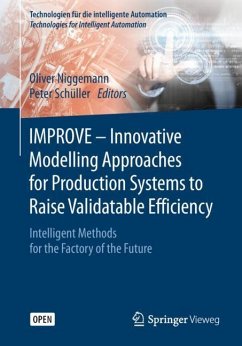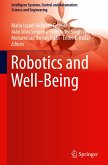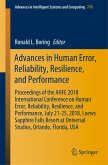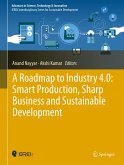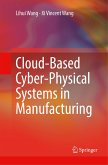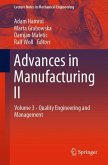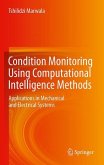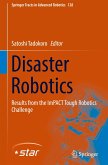IMPROVE - Innovative Modelling Approaches for Production Systems to Raise Validatable Efficiency
Intelligent Methods for the Factory of the Future
Herausgegeben:Niggemann, Oliver; Schüller, Peter
IMPROVE - Innovative Modelling Approaches for Production Systems to Raise Validatable Efficiency
Intelligent Methods for the Factory of the Future
Herausgegeben:Niggemann, Oliver; Schüller, Peter
- Broschiertes Buch
- Merkliste
- Auf die Merkliste
- Bewerten Bewerten
- Teilen
- Produkt teilen
- Produkterinnerung
- Produkterinnerung
This open access work presents selected results from the European research and innovation project IMPROVE which yielded novel data-based solutions to enhance machine reliability and efficiency in the fields of simulation and optimization, condition monitoring, alarm management, and quality prediction.
Andere Kunden interessierten sich auch für
![Robotics and Well-Being Robotics and Well-Being]() Robotics and Well-Being106,99 €
Robotics and Well-Being106,99 €![Advances in Human Error, Reliability, Resilience, and Performance Advances in Human Error, Reliability, Resilience, and Performance]() Advances in Human Error, Reliability, Resilience, and Performance113,99 €
Advances in Human Error, Reliability, Resilience, and Performance113,99 €![A Roadmap to Industry 4.0: Smart Production, Sharp Business and Sustainable Development A Roadmap to Industry 4.0: Smart Production, Sharp Business and Sustainable Development]() A Roadmap to Industry 4.0: Smart Production, Sharp Business and Sustainable Development174,99 €
A Roadmap to Industry 4.0: Smart Production, Sharp Business and Sustainable Development174,99 €![Cloud-Based Cyber-Physical Systems in Manufacturing Cloud-Based Cyber-Physical Systems in Manufacturing]() Lihui WangCloud-Based Cyber-Physical Systems in Manufacturing87,99 €
Lihui WangCloud-Based Cyber-Physical Systems in Manufacturing87,99 €![Advances in Manufacturing II Advances in Manufacturing II]() Advances in Manufacturing II76,99 €
Advances in Manufacturing II76,99 €![Condition Monitoring Using Computational Intelligence Methods Condition Monitoring Using Computational Intelligence Methods]() Tshilidzi MarwalaCondition Monitoring Using Computational Intelligence Methods76,99 €
Tshilidzi MarwalaCondition Monitoring Using Computational Intelligence Methods76,99 €![Disaster Robotics Disaster Robotics]() Disaster Robotics107,99 €
Disaster Robotics107,99 €-
-
-
This open access work presents selected results from the European research and innovation project IMPROVE which yielded novel data-based solutions to enhance machine reliability and efficiency in the fields of simulation and optimization, condition monitoring, alarm management, and quality prediction.
Produktdetails
- Produktdetails
- Technologien für die intelligente Automation 8
- Verlag: Bundesministerium für Bildung und Forschung / Bundesministerium für Wirtschaft und Energie / Hochsch
- Artikelnr. des Verlages: 978-3-662-57804-9
- 1st edition 2018
- Seitenzahl: 140
- Erscheinungstermin: 31. August 2018
- Englisch
- Abmessung: 240mm x 168mm x 8mm
- Gewicht: 249g
- ISBN-13: 9783662578049
- ISBN-10: 3662578042
- Artikelnr.: 52889575
- Herstellerkennzeichnung
- Springer-Verlag GmbH
- Tiergartenstr. 17
- 69121 Heidelberg
- ProductSafety@springernature.com
- Technologien für die intelligente Automation 8
- Verlag: Bundesministerium für Bildung und Forschung / Bundesministerium für Wirtschaft und Energie / Hochsch
- Artikelnr. des Verlages: 978-3-662-57804-9
- 1st edition 2018
- Seitenzahl: 140
- Erscheinungstermin: 31. August 2018
- Englisch
- Abmessung: 240mm x 168mm x 8mm
- Gewicht: 249g
- ISBN-13: 9783662578049
- ISBN-10: 3662578042
- Artikelnr.: 52889575
- Herstellerkennzeichnung
- Springer-Verlag GmbH
- Tiergartenstr. 17
- 69121 Heidelberg
- ProductSafety@springernature.com
Prof. Dr. Oliver Niggemann is Professor for Artificial Intelligence in Automation. His research interests are in the fields of machine learning and data analysis for Cyber-Physical Systems and in the fields of planning and diagnosis of distributed systems. He is a board member of the research institute inIT and deputy director at the Fraunhofer Application Center Industrial Automation INA located in Lemgo. Dr. Peter Schüller is postdoctoral researcher at Technische Universität Wien. His research interests are hybrid reasoning systems that combine Knowledge Representation and Machine Learning and applications in the fields of Cyber-Physical systems and Natural Language Processing.
Concept and Implementation of a Software Architecture for Unifying Data Transfer in Automated Production Systems.- Social Science Contributions to Engineering Projects: Looking Beyond Explicit Knowledge Through the Lenses of Social Theory.- Enable learning of Hybrid Timed Automata in Absence of Discrete Events through Self-Organizing Maps.- Anomaly Detection and Localization for Cyber-Physical Production Systems with Self-Organizing Maps.- A Sampling-Based Method for Robust and Efficient Fault Detection in Industrial Automation Processes.- Validation of similarity measures for industrial alarm flood analysis.- Concept for Alarm Flood Reduction with Bayesian Networks by Identifying the Root Cause.
Concept and Implementation of a Software Architecture for Unifying Data Transfer in Automated Production Systems.- Social Science Contributions to Engineering Projects: Looking Beyond Explicit Knowledge Through the Lenses of Social Theory.- Enable learning of Hybrid Timed Automata in Absence of Discrete Events through Self-Organizing Maps.- Anomaly Detection and Localization for Cyber-Physical Production Systems with Self-Organizing Maps.- A Sampling-Based Method for Robust and Efficient Fault Detection in Industrial Automation Processes.- Validation of similarity measures for industrial alarm flood analysis.- Concept for Alarm Flood Reduction with Bayesian Networks by Identifying the Root Cause.

